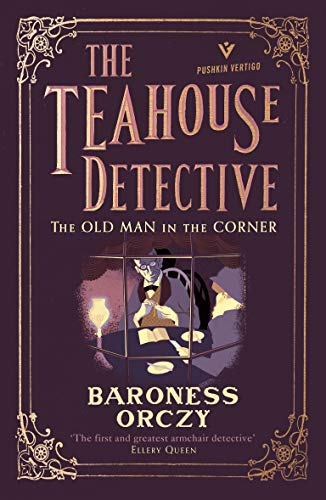

Full description not available
B**C
A favorite author--Orzcy
I have never found a book by Baroness Orzcy that I didn't enjoy and love. She's so good at pulling you into her winding plots.
J**R
Surprise ending
Held my interest
A**E
Enjoyable Response to Sherlock
I'm going to go with a three star rating for this one. It was indeed 'good', but I wouldn't go so far as very good or great. The Baroness wrote these stories after the success of Sherlock Holmes and you can tell as it fills a similar void, without being just simply reading the same stories all over again. And maybe that's the problem, because I was also listening to the complete collection of Sherlock Holmes in the same chunk of time. It might just have been too similar at the same time?But while it does, as I said, fill the same void, how they go about solving the mysteries is very different. Sherlock learns only slightly before the reader does, the old man in the corner already knows and testing you to see if you do. Sherlock is clearly out to stop the villain, but will show mercy on people who simply were caught up in a bad situation. The old man in the corner does nothing to effect events or people in any way, but is content to simply know the facts.Honestly, I spent most of the book wondering about the moral character of a man who knows the truth of someone's crimes and instead of bringing it to light, simply lets things play out as they have.It was interesting to see how, perhaps because the Baroness was a woman, women were portrayed in these stories. They tended to have larger roles, operated more independently, and simply appear more frequently. Not nearly as much as they would in stories written today, but more than I usually see in other stories written at that time.Overall, glad I read it, but probably won't read the sequel.No warnings apply.Thank you to NetGalley for a free eCopy in exchange for an honest review.
M**N
Old-fashioned but a lot of fun
These stories relate the crime-solving deductions of a somewhat amoral old man who sits in a tea shop, not a man of action but of cerebration. The epitome of the "armchair detective." I find the whole premise a lot of fun, and I really enjoyed these short tales. The fact that they're old-fashioned actually makes them kind of exotic now -- they're a lot different than the more violent, more psychologically attuned and more procedure-based stories that chiefly sell nowadays.The mysteries themselves are not too easy, but they're not too tough, either. I'd compare them in difficulty and purpose to Encyclopedia Brown, and I honestly don't mean that as a slight because many Brown stories were pretty entertaining. They're not as involved as Holmes stories, but they're not really meant to be.If you're a deep fan of detective fiction, you'll enjoy these tales written in the early 20th century, for historical reasons if nothing else. I have to say that I appreciate simple puzzle stories like these as they don't come with all the heavy sociological baggage that comes with contemporary crime stories. Don't get me wrong, I do enjoy modern crime stories a great deal, but it's also nice to have some reading matter than is truly escapist. I'm looking forward to the second volume.
J**L
A Cheap Dupin Knockoff
In 1887 Arthur Conan Doyle stole/borrowed Edgar Allan Poe’s eccentric detective C. Auguste Dupin, and transformed him into the wildly popular Sherlock Holmes. While Holmes is arguably more entertaining than Dupin, the host of imitations created by other authors trying to cash in on the “genius detective” craze were seldom more than pale imitations. Such is Baroness Orczy’s unnamed Old Man in the Corner.This collection of short stories features conversations between a young reporter and an “odd scarecrow” of a man who sits in the corner of a teahouse tying complex knots in a piece of string while quietly (but arrogantly) expounding to her the answers to unsolved crimes. His deductions are based almost exclusively on attending inquests and reading the stories as they appear in the newspaper. The old man has no desire to bring the criminals to justice and offers no concrete evidence that could do so. He is content with working out to his satisfaction (and his listener’s amazement) what must have happened.For me, everything about the book was very bland. The characterization was shallow, relying on the same few stock descriptions (“scarecrow” “sarcastic” “tying and untying complex knots”). The subject matter of the stories was the usual assortment of blackmail, gambling debts, unhappy marriages, inheritance disputes, etc, with nothing terribly unexpected, exotic, or spine-tingling, and the solutions to the mysteries became tediously similar after the first two or three. The eARC Pushkin Vertigo edition that I read provided nothing in the way of background, commentary, or any other added interest.Overall, if you’re really into classic armchair detectives, you will probably enjoy this, but if you’re just dipping into the “genius detective” genre go with Holmes or Dupin.
J**Y
Boring!
So dull. I can't think the police are so thick. Some of the stories I can't understand the end. Doesn't move forward.
J**E
Predictable outcomes
Very dated and by about the fourth story, you can predict ‘who done it’ very quickly. But hey, it was free!
K**E
Good buy
Good read
V**E
A treat.
A joyful discovery - never knew the creator of the Scarlet Pimpernel wrote other (rather wonderful) stories.
K**R
Easy reading
A bit too easy to work out
Trustpilot
2 months ago
1 month ago